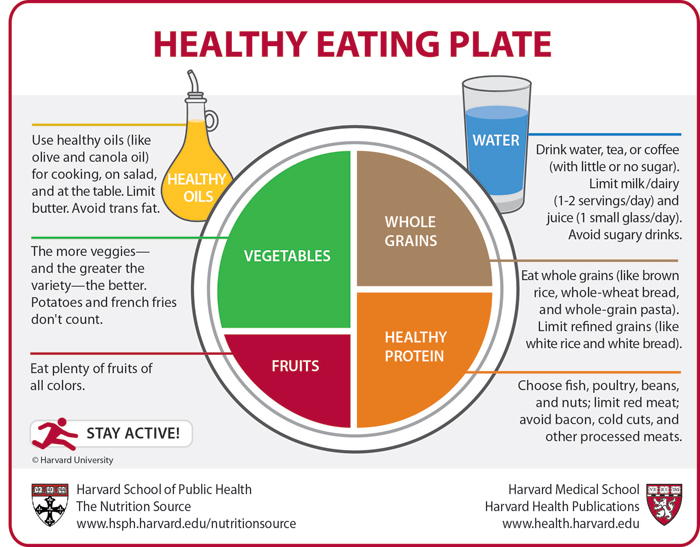Harvard unveils the Healthy Eating Plate
Experts at Harvard School of Public Health unviels the Harvard Healthy Eating Plate. It’s a modified version of the USDA’s MyPlate which was released early this year.
The Health Eating Plate aims to correct the MyPlate. Experts at Harvard School of Public Health believes that the Healthy Eating Plate is more complete and shows the healthy choices. For example, the USDA’s MyPlate only says Grains. The Healthy Eating Plate specifies Whole Grains.
Here’s the Healthy Eating Plate and the explanation about each section.
Eat Well.
Click on the image for a larger view
Vegetables: Eat an abundant variety, the more the better. Limited consumption of potatoes is recommended, however, as they are full of rapidly digested starch, which has the same roller-coaster effect on blood sugar as refined grains and sweets. In the short-term, these surges in blood sugar and insulin lead to hunger and overeating, and in the long term, to weight gain, type 2 diabetes, heart disease, and other chronic disorders.
Fruits: Choose a rainbow of fruits every day.
Whole Grains: Choose whole grains, such as oatmeal, whole wheat bread, and brown rice. Refined grains, such as white bread and white rice, act like sugar in the body. Eating too many refined grains can raise the risk of heart disease and type 2 diabetes.
Healthy Proteins: Choose fish, poultry, beans, or nuts, which contain healthful nutrients. Limit red meat and avoid processed meats, since eating even small quantities of these on a regular basis raises the risk of heart disease, type 2 diabetes, colon cancer, and weight gain.
Healthy Oils: Use olive, canola, and other plant oils in cooking, on salads, and at the table, since these healthy fats reduce harmful cholesterol and are good for the heart. Limit butter and avoid trans fat.
Water: Drink water, tea, or coffee (with little or no sugar). Limit milk and dairy (1-2 servings per day) and juice (1 small glass a day) and avoid sugary drinks.
Know more about the Harvard Healthy Eating Plate at the Harvard School of Public Health Website.
Disclaimer: This article is not intended to provide medical advice, diagnosis or treatment. Views expressed here do not necessarily reflect those of Takbo.ph.

